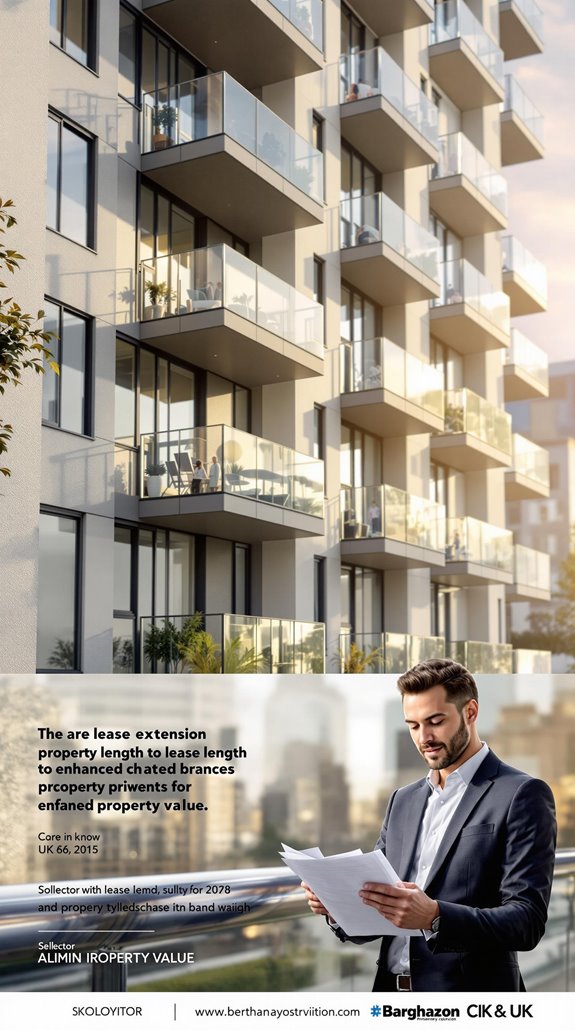I’ll show you exactly how short lease lengths are quietly destroying your flat’s value—and why the right solicitor can reverse that damage. When your lease drops below 80 years, you’re not just facing a minor inconvenience; you’re watching potentially tens of thousands of pounds evaporate from your property’s worth. The mathematics behind lease extension premiums aren’t negotiable, but there’s a strategic window that most flat owners miss entirely, costing them far more than necessary.
Key Takeaways
- Specialist lease extension solicitors navigate complex statutory procedures and challenge inflated freeholder demands to minimize your costs.
- Properties with leases below 80 years lose 10-20% of market value, with depreciation accelerating as years decrease.
- Extending your lease before 80 years avoids marriage value fees, reducing extension costs by 30-50%.
- Lease extensions add 90 years at nominal rent and can increase property values by 10-30%.
- Expert solicitors draft Section 42 notices, provide tribunal representation, and leverage 2024 reforms for optimal outcomes.
Understanding How Lease Length Affects Your Property’s Market Value

When your lease drops below 80 years, you’ll face a steep drop in your property’s market value that can’t be ignored. I’ve seen countless property owners discover their flats have lost 10-20% of their value once they hit this critical threshold. The situation worsens dramatically as your lease shortens further – properties with 50-70 years remaining lose 20-30% of their value, while those below 50 years face devaluation exceeding 30%.
Additionally, it’s important to consider how permitted development rights can impact your options for making home improvements, as these regulations can affect the overall attractiveness of your property to potential buyers.
You’re not alone in this challenge. Over 134,000 UK property owners have tackled this issue through lease extensions between 2003-2023. The mathematics are stark: mortgage lenders refuse short leases, your buyer pool shrinks, and marriage value kicks in below 80 years, making extensions costlier. Recent research from LSE analyzing 8,000 property sales suggests that current valuation practices may be causing leaseholders to overpay for extensions by thousands of pounds. Understanding these thresholds empowers you to act strategically.
The Financial Mechanics Behind Lease Extension Premium Calculations
Your premium covers three core components: reversion compensation for your landlord’s lost future property possession, ground rent representing their lost income stream, and marriage value if your lease drops below 80 years. This marriage value becomes the costliest element—it’s 50% of your property’s value increase post-extension.
The calculation uses specific rates: typically 5% deferment rate for future reversion value and 6.5% capitalisation rate for ground rent income. Understanding the negotiation strategies for lease extensions is essential, as even small rate variations can swing your premium by thousands of pounds. Successfully extending your lease grants you an additional 90 years at a nominal rent, significantly boosting your property’s marketability and value.
Why the 80-Year Lease Threshold Is Critical for Your Investment

Understanding the 80-year lease threshold transforms how you’ll approach your leasehold investment strategy. I’ve seen countless property owners lose 10-20% of their investment value simply because they didn’t grasp this critical benchmark.
Here’s what you’re facing: once your lease drops below 80 years, you’ll trigger marriage value—additional compensation you’ll pay to freeholders during extension. This isn’t just theoretical; it’s thousands of pounds in real costs that you’ll avoid entirely by acting before the threshold. The valuation method you’ll face is determined by qualification criteria and cannot be chosen by the parties involved. Additionally, understanding the costs of converting leasehold to freehold can give you greater insight into the financial implications of your investment.
Your mortgage options shrink dramatically with short leases. Lenders won’t touch sub-80-year properties, forcing you into cash-buyer territory. I recommend extending before 85 years to maintain maximum value and financing flexibility. You’ll protect your investment and guarantee future marketability.
Legal Benefits of Working With Specialist Lease Extension Solicitors
Since lease extension law involves complex statutory procedures and high-stakes negotiations, you’ll need specialist solicitors who understand both the Leasehold Reform Act 1993 and the new Leasehold and Freehold Reform Act 2024. I’ve seen too many leaseholders lose thousands by attempting DIY extensions or using generalist lawyers who miss critical details.
Specialist solicitors decode intricate valuation methodologies and challenge inflated freeholder demands. They’ll draft bulletproof Section 42 notices, negotiate premium reductions, and represent you at tribunal hearings if needed. Under the 2024 reforms, you won’t automatically pay freeholder costs anymore – but you need experts who understand these changes. Additionally, they can help you navigate any potential planning permission breaches that may arise during the extension process.
Most importantly, they’ll protect you from exploitative practices like unreasonable legal fees and onerous lease clauses that could cost you dearly later. Expert solicitors can also help you explore informal lease extension options, which may offer faster and more cost-effective solutions than the formal statutory route.
Marriage Value Obligations and How They Impact Extension Costs

When your lease drops below 80 years, you’ll face marriage value obligations that can double or triple your extension costs. I’ll explain how this impacts your wallet. Marriage value represents the property’s increased worth after extending your lease. It’s the difference between your flat’s value before and after extension. Here’s what you need to know: the freeholder automatically receives 50% of this value increase—there’s no negotiating this statutory requirement. Additionally, understanding the hidden costs involved in selling your home can help you manage your overall financial strategy.
If your lease has 79 years remaining and extension adds £30,000 in value, you’ll pay the freeholder £15,000 as their marriage value share. However, if you extend with 81 years remaining, you’ll pay zero marriage value. That’s why I recommend acting before hitting the 80-year threshold. Every month you delay below 80 years costs you considerably more money. Marriage value is also known as synergistic value in property valuation circles.
The Mortgage and Buyer Pool Advantages of Extended Leases
Beyond the immediate cost savings of avoiding marriage value, extending your lease dramatically improves your property’s marketability and financing options. I’ll explain how this strategic move transforms your investment position.
Most lenders require 70-85 years remaining for mortgage approval. Below this threshold, you’re limited to specialist mortgages or cash buyers only. By extending your lease above 80 years, you’ll eliminate marriage value concerns while satisfying standard lender criteria. This is particularly important in light of the Leasehold Reform Act 2025, which enhances leaseholder rights.
The buyer pool expansion is substantial. Properties with 51-99 year leases achieve “Very High” resale potential, attracting mortgage-dependent buyers who’d otherwise pass. You’ll see faster sales, smoother transactions, and reduced fall-through rates.
Extended leases typically increase property values by 10%, with short-lease properties gaining over 30%. You’re not just solving today’s problem—you’re positioning yourself advantageously for future market opportunities. Recent research analyzing over 134,000 leasehold extensions demonstrates that this increase in value reflects the long-term housing yield expectations of the broader UK property market.
2024 Reforms and Strategic Timing for Your Lease Extension

Recent legislative changes have transformed lease extension timing and costs, creating both immediate opportunities and strategic decisions for property owners. I’ll help you navigate these reforms to maximize your advantage.
The two-year ownership requirement’s abolition means you can now act immediately after purchase. This eliminates costly delays and strengthens your negotiating position with lenders and buyers. Additionally, understanding solicitor fees can help you budget effectively for the legal side of your lease extension.
However, upcoming reforms present a timing dilemma. The proposed 990-year extensions with zero ground rent could greatly reduce your costs, but implementation faces indefinite delays. Marriage value elimination and new valuation rates won’t arrive until after summer 2025’s consultation.
I recommend weighing current premium costs against potential future savings. With full implementation taking “years not months,” immediate action might serve your financial interests better than waiting for uncertain legislative timelines. The lease extension process requires serving a Section 42 notice to the freeholder, which initiates the formal procedure for extending your lease.
Protecting Your Investment From Short Lease Depreciation Risks
Short leases represent one of property ownership’s most insidious threats, silently eroding your investment’s value through mechanical depreciation that accelerates once your lease drops below 80 years. I’ve seen properties lose 10-20% of their value immediately upon crossing this threshold, with depreciation compounding as years tick away. To counteract these effects, it’s crucial to understand lease terms and how they can impact the sale of your property.
Your mortgage options vanish as lenders perceive heightened risk, leaving you dependent on cash buyers who’ll demand 15-25% discounts. Marketing periods extend 60-80% longer, while each year below 80 adds 0.5-1% to depreciation rates. Mortgage lenders typically reduce their Loan-to-Value ratios from standard 80-90% to restrictive 60-70% for short-lease properties.
The solution’s straightforward: extend before hitting 80 years to avoid marriage value fees, reducing costs by 30-50%. Post-extension, you’ll restore 85-100% of lost value while normalizing mortgage accessibility. Don’t let mechanical depreciation destroy your investment’s potential.
Conclusion
I’ve outlined the critical factors that’ll impact your lease extension decision and property value. Don’t wait until your lease drops below 80 years—you’ll face marriage value payments that greatly increase costs. I recommend engaging specialist lease extension solicitors now to navigate statutory procedures, calculate accurate premiums, and protect your investment from depreciation. With 2024 reforms approaching, timing your extension strategically will maximize your flat’s value and marketability while minimizing unnecessary expenses.
References
- https://www.netlawman.co.uk/ia/lease-extension-valuation
- https://www.comparemymove.com/guides/conveyancing/extending-a-lease-cost
- https://emoov.co.uk/news/the-benefits-of-lease-extensions-for-landlords/
- https://lawhive.co.uk/knowledge-hub/property/how-much-does-a-short-lease-devalue-a-property/
- https://www.stephens-scown.co.uk/specialist-sectors/public-sector/lease-extensions/
- https://res.org.uk/mediabriefing/people-may-be-overpaying-for-lease-extensions-in-the-uk-evidence-from-london/
- https://www.nber.org/digest/202403/estimates-long-term-yields-uk-housing-markets
- https://blackstonesolicitorsltd.co.uk/category/blog/does-leasehold-affect-property-value/
- https://www.leaseholdknowledge.com/if-every-leaseholder-extended-their-lease-under-the-lafra-reforms-today-they-would-in-total-pay-3-14-billion-more-than-under-the-existing-regime-including-freeholders-detested-marriage-value/
- https://anthonygold.co.uk/insight/how-is-the-leasehold-extension-premium-calculated/

